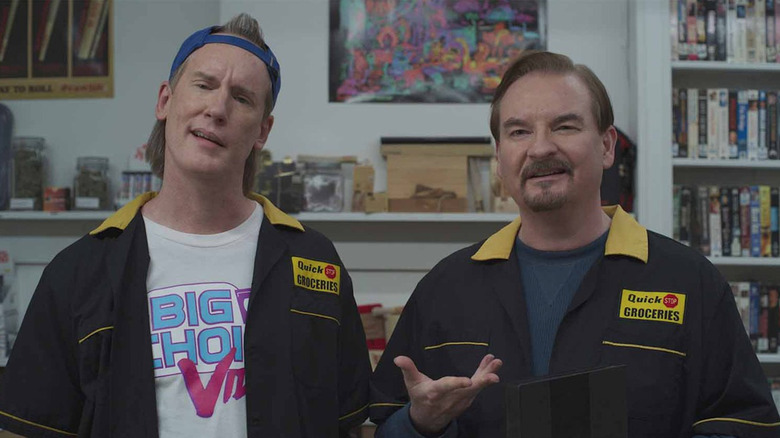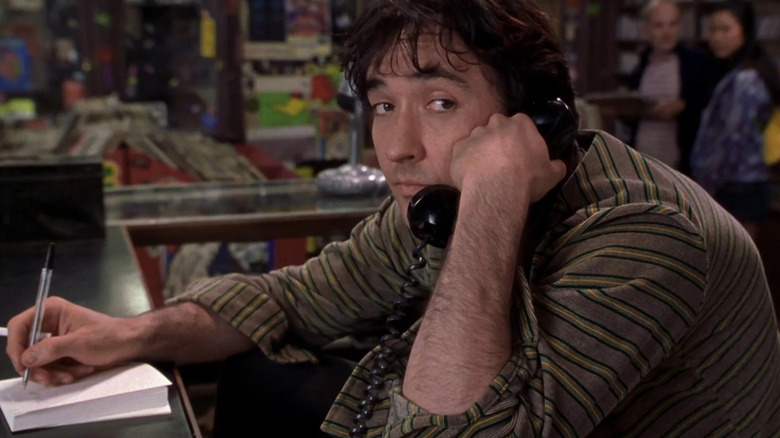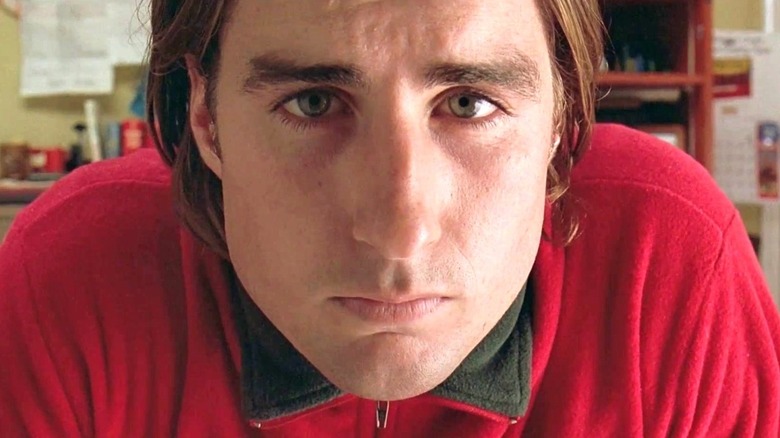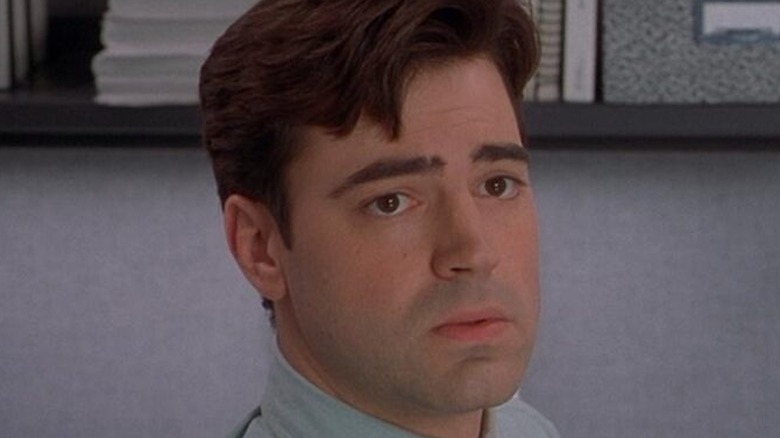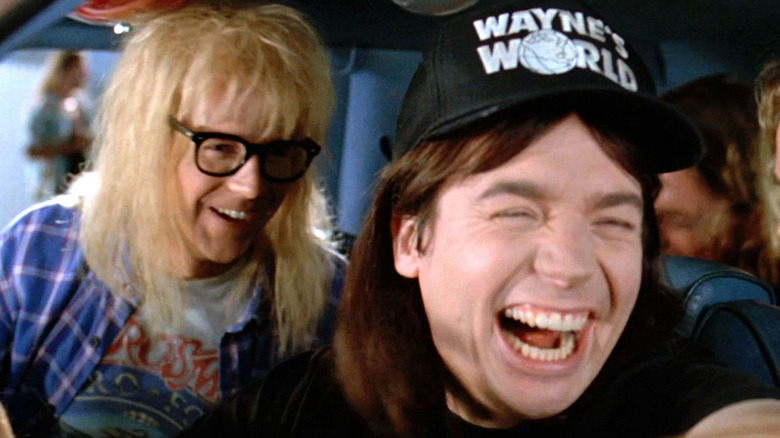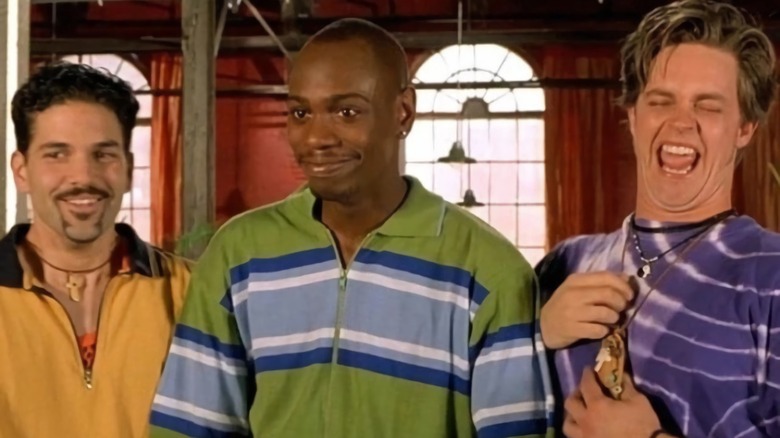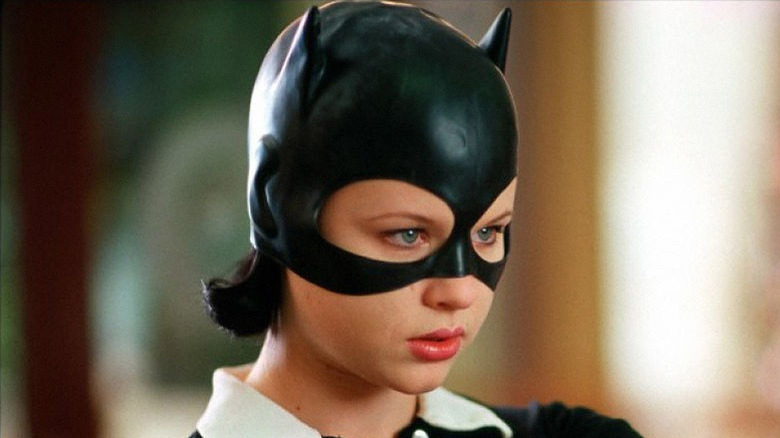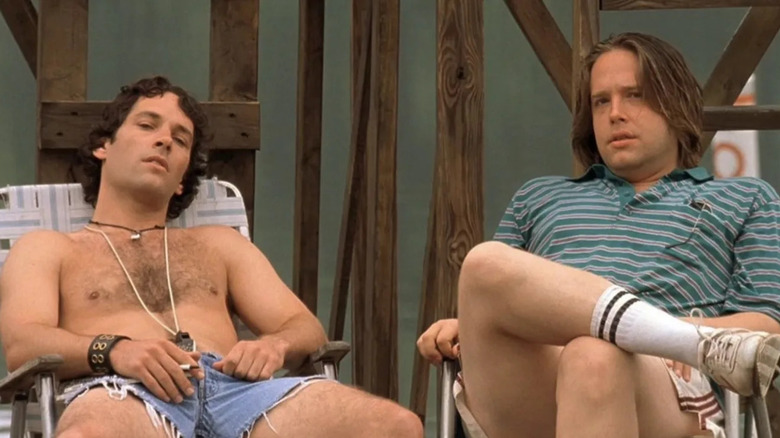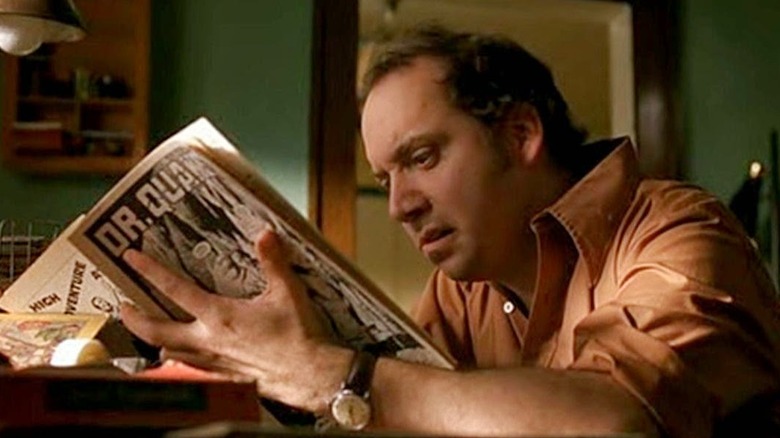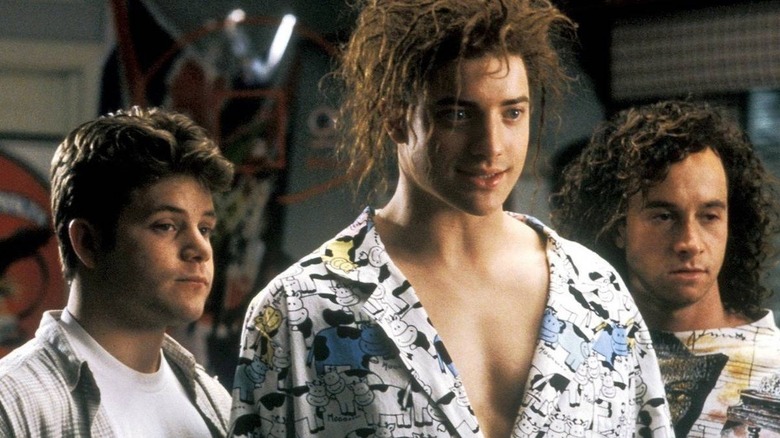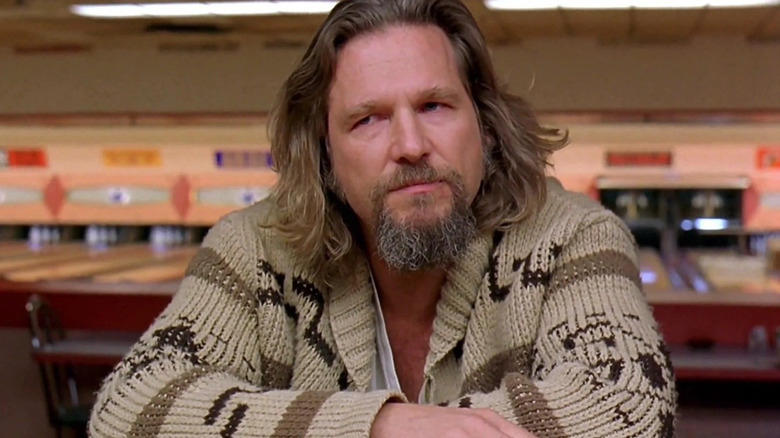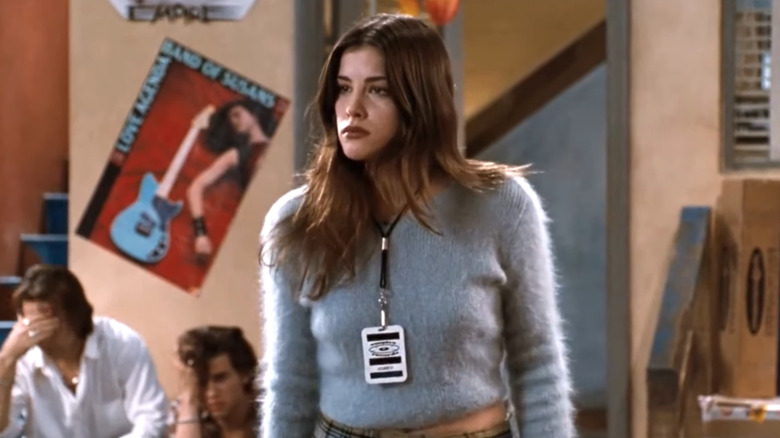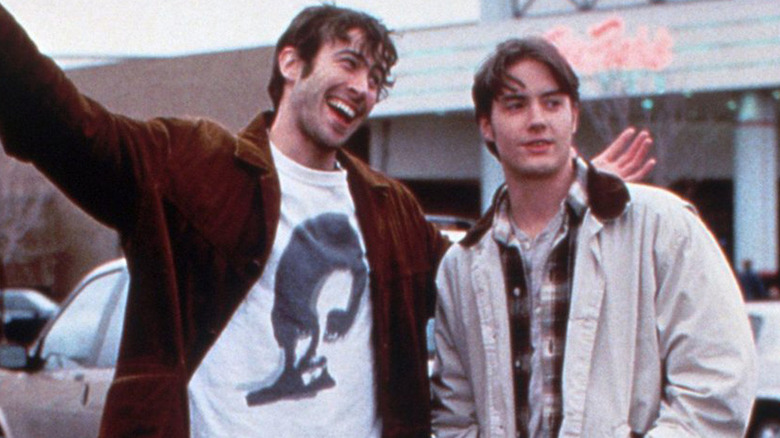12 Great Movies Like Clerks III Fans Should Watch
In 1994, slacker-of-all-trades Kevin Smith released "Clerks" and instantly cemented his place in the cinematic landscape — or more accurately, created that place from the ground up. Smith followed up on "Clerks" with a string of similarly irreverent and pop culture-obsessed movies, officially creating his interconnected View Askewniverse and establishing himself as one of the leading voices in the world of snarky, Generation X geekdom. Much of what allowed "Clerks" to win over fans and critics alike — including its colorful characters, meta humor, and painfully relatable nihilism — has carried through in Smith's other movies, including 2006's "Clerks II" and now, almost 30 years since the original, "Clerks III."
Stars Brian O'Halloran and Jeff Anderson are back as the comedic buddy duo Dante and Randal, now with almost three additional decades' worth of pointless philosophical musings and jadedness. Because "Clerks III" is a Smith movie, the two are of course joined by fan favorites Jay and Silent Bob, played by Jason Mewes and Smith himself, whose combined century of existence hasn't made the pair any more mature than they were in 1994.
If you're a fan of "Clerks III," and to an extent any of Smith's comedies, there are a ton of movies in a similar vein that you can check out next to scratch that nerdy itch. Here are 12 great movies like "Clerks III" fans should watch.
High Fidelity
If you change the setting of the "Clerks" movies from a convenience store (and in "Clerks II," a Mooby's franchise) to a record store and give its characters just a tad more leeway to talk into the camera, you're about 90% of the way to "High Fidelity." The 2000 comedy stars John Cusack as Rob Gordon, essentially a hipster version of Dante, and Jack Black in his first leading role, whose character, Barry, is predictably just Black with another name (and we'll always love it). Perhaps the biggest difference between the two movies is that the central struggle in "High Fidelity" is Rob trying to understand his on-again-off-again love, whereas in "Clerks," Dante spends more of that effort on his relationship with his platonic soulmate, Randal.
If you love the way in which all three "Clerks" movies, and all their major characters, communicate through references to movies, TV, and comic books, then you'll love "High Fidelity." The characters do the same, just with an obviously heavier focus on music, like when they mourn the loss of Rob's girlfriend's father by assembling "Top Five Songs About Death: A Laura's Dad Tribute List." Not only is "High Fidelity" similar to the "Clerks" movies in content and style, but it is a similarly beloved classic.
Bottle Rocket
Before Wes Anderson became known as the king of his own hypersymmetrical, pastel world, he was just a (relatively) regular indie filmmaker looking to make it in the business of cinema. His first project to garner significant attention was a short film starring brothers Owen and Luke Wilson, which he was able to adapt into a major motion picture of the same name: "Bottle Rocket."
Though the movie has a lot in common with Anderson's later work — for example, how the sets, costumes, and dialogue are all meticulously planned and stylistic, meant to pit realism against objectivity — it has just as much in common with a lo-fi comedy like "Clerks." The production value for "Bottle Rocket" is low and it shows, but just like "Clerks," it only adds to the movie. It's rough, simplistic, and relatable at every point — even during its climactic "heist."
The movie's three main characters, despite all the Anderson-isms that they possess, are at their heart just regular, hapless nobodies with dreams of a better life, no idea how to accomplish it, and no ambition to work hard for it — hence the heist in "Bottle Rocket" and the movie shoot In "Clerks III."
Office Space
No media encapsulates white-collar malaise more perfectly than Mike Judge's cinematic peak, "Office Space." Peter, played by the perfectly blasé Ron Livingston, is your average joe slaving away as another cog in the corporate hell machine when he finds himself thoroughly and permanently relaxed during an occupational hypnotherapy session. Suddenly, the rigamarole of impressing women he doesn't really care for, a boss he doesn't respect while doing a job he loathes, is suddenly gone. He shirks confirmative boundaries such as the office dress code and cubicles, but instead of being punished, he's rewarded and fails upwards.
Meanwhile, some of his non-enlightened coworkers, as well as Peter's new flame (Jennifer Aniston), find themselves out of work in an unjust, almost karmic response to his fortune. They chose to seek vengeance on their company and their despicable bosses in a series of iconic scenes, including the infamous copy machine beatdown set to Geto Boys' "Still."
This formula of disillusionment with the mainstream followed by a welcomed descent into anarchy is part and parcel of Smith's many works. More often than not, it's Jay and Silent Bob who voice the nihilism through scathing and potty-mouthed commentary on the absurdity of mass delusion and abandonment of individual thought.
Wayne's World
If Jay and Silent Bob have soulmates — aside from each other, of course — they're Wayne Campbell and Garth Algar, the cohosts of their own show on Cable 10 — Aurora, Illinois Community Access Channel — and stars of the 1992 comedy gem "Wayne's World." Although Wayne and Garth, portrayed by comedy legends Mike Myers and Dana Carvey, respectively, keep their antics decidedly more PG-13 than Jay and Silent Bob, there's no doubt that the two pairs of basement-dwelling, air-headed, wannabe musicians share the same legally dubious habits and get up to the same amount of trouble. The two pairs also share the same habit of setting out on cartoonish yet epic adventures, the main difference being whether or not they're making a TV show or unmaking a movie.
Yes, the first "Clerks" movie only featured Jay and Silent Bob as running jokes, but as the View Askewniverse has evolved, the pair has taken up more and more cinematic real estate, to the point where they're now the main attraction for many viewers. If you can air guitar with Jay and Silent Bob in the mall, you'll love headbanging with Wayne and Garth in the car.
Half Baked
Dave Chapelle has been through a number of phases in his life. He was the king of sketch comedy during the tragically short run of "Chappelle's Show." Then he played the mysterious hermit, shunning the public eye at all costs for the better part of a decade. He made a momentous comeback, headlining stand-up tours and hosting "Saturday Night Live." Then finally, he became one of the largest powder-kegs of controversy in the world of entertainment. But before all that, Chapelle was just another struggling actor-comedian, building up his resume and fame however he could. Among the many diamonds in the rough of his early career, one of the brightest is the critically reviled but cult hit "Half Baked."
It's not just the constant stoner comedy that puts "Half Baked" in the same league as "Clerks III," but also its world and characters. Chappelle's character Thurgood is every bit the listless, down-on-his-luck loser that Dante is and surrounds himself with friends who are just as exaggerated and animated as Dante's. Jim Breuer's Brian makes a solid replacement for Jay, Guillermo Díaz's Scarface is an excellent Randal, and evil drug kingpin Samson Simpson (Clarence Williams III) is his own, smoke-hazed version of the suits who run the Mooby empire.
Ghost World
Aside from his many turns as an actor, producer, writer, and-or director in a mountain of TV and film projects, Kevin Smith is also renowned as a comic book author. He's put out celebrated work for DC, Marvel, and a number of independent publishers, and that second life shows through in his movies, which almost all feature lengthy conversations about comic books and their characters. Like anyone in the industry, Smith is undoubtedly familiar with its landmark publications, and for a sarcastic, self-aware Gen X-er like Smith, one of the absolute biggest landmarks is Daniel Clowes's '90s masterpiece "Ghost World."
Like the comic, the movie version of "Ghost World" is considered a classic, and the film has even earned its way into the esteemed Criterion Collection. The distributor called the movie "an idiosyncratic portrait of adolescent alienation that is at once bleakly funny and wholly endearing" — which should sound familiar if you've already seen any of the "Clerks" franchise. "Ghost World" is about a pair of cynical, disillusioned friends whose overdeveloped sense of criticism doesn't quite match up with their lack of actual experience — which again, should sound delightfully familiar.
Wet Hot American Summer
In any list that revolves around a "Clerks" movie, a View Askewniverse movie, or even any Kevin Smith film in general, the phrases "cult classic" and "sleeper hit" are going to come up again and again. Of all the movies on this list to which those terms could apply, no movie embodies them more than "Wet Hot American Summer," the 2001 all-star, camp (in both senses of the word) comedy that was released to an astounding amount of critical derision but made millions of fans fall in love.
The movie follows the counselors and other staff of a New England summer camp on their last few days of the season, most of whom spend their precious remaining hours trying to sleep with whoever will have them. The movie is silly, exaggerated, and thoroughly tongue-in-cheek, and if you're on board with that — which we hope you are, Smith fans — then "Wet Hot American Summer" is perfect for you. If you're not sold from that description, then a sampling of the movie's cast should win you over.
Among others, it features Paul Rudd, Bradley Cooper, Amy Poehler, Molly Shannon, both Michael Showalter and Michael Ian Black, Janeane Garofalo, Elizabeth Banks, David Hyde Pierce, Christopher Meloni, Joe Lo Truglio, and Judah Friedlander — and in case you're wondering, that impressive cast isn't wasted, a la the "worst film of all time," "Movie 43."
American Splendor
The 2003 biographical comedy "American Splendor" is one of those movies like "Ghost World" or "Scott Pilgrim vs. the World" that based itself on an iconic indie comic book and captured that book's tone almost perfectly. For adaptations as successful as these, the hard lines between the canon and non-canon versions tend to soften, and diehard fans often revel in the expanded world they gain access to. Kevin Smith has always leaned into this effect, translating "Clerks" and "Jay and Silent Bob" into their own comics (and even their own animated series). Certainly, "American Splendor" does the same, as the movie is partly an adaptation of the comics of the same name and partly a biographical dramedy about the comic's creator, Harvey Pekar (and to further muddy the waters, the comic is itself an autobiography about Pekar).
Though "American Splendor" is certainly darker and more melancholy than the zanier Smith films like "Chasing Amy" and "Jay and Silent Bob Strike Back," it definitely slots in well alongside the original "Clerks" and what pieces of it remains in the DNA of "Clerks II" and "Clerks III." Dante and Randal spend "Clerks III" trying desperately to feel alive, and Paul Giamatti's Pekar, for all his grumbling, spends "American Splendor" doing the same.
Encino Man
We are once again officially in the Brenaissance (i.e. the Brendan Fraser Renaissance). You likely remember the last era, which included such classics as "The Mummy" series, "Bedazzled," and "Airheads," all of which feature Fraser as a charming leading man. But Fraser is so charming, in fact, that he does not even need to have actual lines to lead the cast of the 1992 cult classic "Encino Man."
Fraser's character Link, as he comes to be named, is a caveman accidentally thawed in high school reject Dave's (Sean Astin) backyard excavation project. Dave's BFF (Pauly Shore) does what Shore did best in the '90s and fills his scenes with a smoky haze, but he also lends Dave some truly touching emotional support. The two high schoolers try to modernize Link to varying degrees of hilarious failure. The emotional climax is when Astin finally realizes that being genuine to yourself outweighs attempting to climb the social ladder via unfrozen caveman-clout (not a very universal moral). If you're watching "Clerks III" for '90s nostalgia, hapless stoners with improbable schemes, or charming, sincere friendships, then "Encino Man" is for you.
The Big Lebowski
There is a lot in the Coen brothers' movies that puts them miles apart from Kevin Smith's. The brothers tend to play things more seriously, and even when they're going for laughs, they do so through oblique dissections of American culture. Smith, on the other hand, is content with the easy, surface-level laughs — and he's great at them, so why shouldn't he? But for all their differences, the Coens' comedies and Smith's end up in some very similar places, and no movie demonstrates this better than the Coens' beloved 1998 comedy, "The Big Lebowski."
The titular Lebowski, better known as the Dude (Jeff Bridges), could walk into the Quick Stop to chat with Dante and Randal and not seem out of place at all. Like so many of the characters in "Clerks III" and its related movies, the Dude is a stoner and slacker whose unassuming appearance belies a surprising amount of intelligence and depth inside. The Dude and his friends might fail essentially every aspect of their proposed schemes in the movie, but that doesn't keep them from eloquently dissecting nihilism as a philosophy. In that way, they're a lot like Randal and Dante exposing the secret evil of the Rebel Alliance in "Star Wars."
Empire Records
It seems like the '90s was the decade for cult classic comedies, and just from its critic and fans ratings alone, it's clear that "Empire Records" is one of the most exemplary of the group. Like "High Fidelity," the main cast of "Empire Records" all work in a record store, but unlike John Cusack and Jack Black's characters in the former, the Empire crew, for the most part, act and speak like actual human beings. There's nothing wrong with the quippiness and cleverness of "High Fidelity," but the fact that the teens and 20-something losers in "Empire Records" actually display the depressions of their humdrum work lives makes them a solid companion crew to the Quick Stop and Mooby's teams that star in the "Clerks" movies.
Yes, the characters don't have the chance to arc, and yes, the whole film is kicked off by the most absurd inciting incident in screenwriting history (a random record store employee deciding to steal the store's money and bet it on a craps table in Atlantic City to keep the store from being bought out), but from there it becomes a charming slice-of-life story with a bunch of relatable, confused, and anxious customer-service employees.
Mallrats
It had to happen at least once: You can't recommend movies to fans of one of the "Clerks" movies without mentioning at least one other Kevin Smith film set in the View Askewniverse. But for the sake of variety, we'll keep it to just one, and if there is to be only one, it has to be "Mallrats." The movie was Smith's direct follow-up to the first "Clerks," brought back standouts Jay and Silent Bob, and kept every bit of the reverence to geek culture — and even amped it up. For every ounce of cult adoration that the first "Clerks" got from fans, "Mallrats" earned two.
As Smith told Entertainment Weekly, the movie's initial failure and subsequent cult success were simply a result of the film being ahead of its time. "In 1995, it painted a portrait of a world where everybody knew about Marvel comics and knew who Stan Lee was," Smith recalled. "And in 1995, my world looked like that but the world didn't look like that. And then, years later, the world starting looking a lot more like my world and so the movie aged incredibly well." In a way, "Mallrats" is a lot like the characters in the "Clerks" movies: Despite being so frequently overlooked, it ends up showing the world just how smart and funny it truly is.
